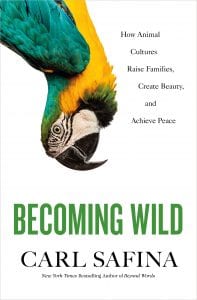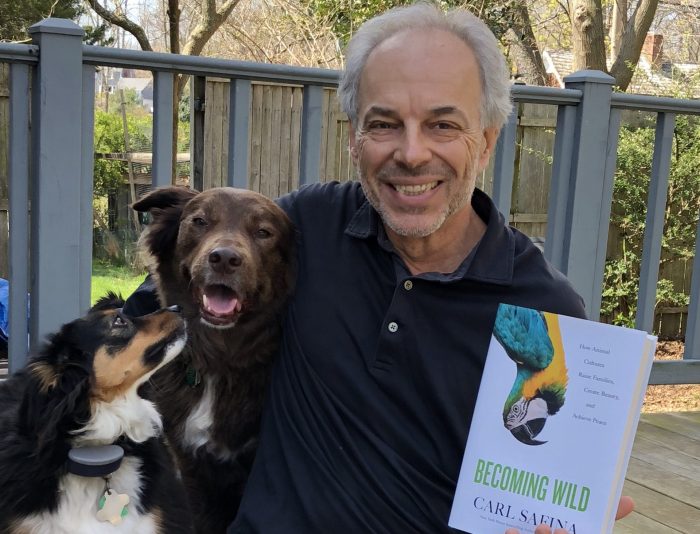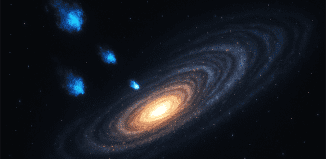Book Review: ‘Becoming Wild’
Reviewed by Jeffrey Sanzel
“A sperm whale learns who she will be journeying with, a macaw casts a covetous eye on a beautiful neighbor, a chimpanzee learns to pay to play. Culture creates vast stores of unprogrammed, unplanned knowledge. The whole world speaks, sings, and shares the codes.”
Carl Safina’s latest book, Becoming Wild: How Animal Cultures Raise Families, Create Beauty and Achieve Peace (Henry Holt and Co.), is a fascinating look at the world of animal culture. It is an analysis of what is passed down (inherited) and what is learned (culture).
Much of the study focuses on communication within the species and how animals form their own societies. “A lot of learning travels socially from parents to offspring or from a group’s elders.” the author doesn’t so much redefine the term culture but, instead, encourages us not to be quite so human-centric in our perceptions.
 Safina divides the book into the study of sperm whales (families); scarlet macaws (beauty); and chimpanzees (peace). Each of the three sections is rich, detailed and engaging enough to be a book onto itself. He has brought them together under the umbrella of his exploration of culture.
Safina divides the book into the study of sperm whales (families); scarlet macaws (beauty); and chimpanzees (peace). Each of the three sections is rich, detailed and engaging enough to be a book onto itself. He has brought them together under the umbrella of his exploration of culture.
Each is given a detailed history of the species; description of their habitats; personal characteristics; intersection with the human world; and many fascinating details in both macro and microcosm. This is expertly mixed with his first-hand accounts of his experiences among them as well as the people with whom he takes the journey. It is both objective and wholly personal.
His observations are enlightening: “Chimps horrify and delight us because we recognize in them parts of ourselves. We see in them aspects of our own passions, and so they hold us in fascination. We cannot look away. So much of what is uncomfortable for us in watching chimps is their excruciating similarity to us.” The book is rife with these epiphanies that are presented so simply and yet with such acumen.
One point that Safina makes is the debate over nature vs. nurture. His belief is that it is impossible to separate them as they interact. “Humans,” he writes, “are genetically enabled to acquire any human language. But we must still learn a language. Genes facilitate the learning, but they do not determine whether we will speak Russian.” Applying this to the terms of his overall thesis: “Genes determine what can be learned, what we might do. Culture determines what is learned, how we do things.”
Safina has exceptional clarity and explains his ideas with focus and an underlying hint of humor that bring the reader further into his universe. There are a handful of black-and-white sketches but there are eight pages of glorious color plates. These should be studied prior to reading each section as they will give the ideal visual compliment to the descriptions.
Safina writes in engaging prose, rich in detail, vivid in his descriptions. The depictions of these beings in their habitats truly give a sense of place in a thrilling and absorbing way.
The fact that he is out there, in the midst of it, gives a sense of his joy and wonderment and his unceasing desire to understand. He never loses his awe of the depth and breadth of the natural world.
He is a teacher, a student, and a tour guide. “I seek encounters that will enable me not just to see … not just to observe … but to penetrate past the labels and feel the beings as selves, living with their families, sharing the air where our two worlds meet.” Safina succeeds in his goal —and shares with grace, passion, and honesty.
An ecologist and a MacArthur Fellow, Carl Safina is the author of numerous books on the human relationship with the rest of the living world. He holds the Endowed Chair for Nature and Humanity at Stony Brook University and is founder of the not-for-profit Safina Center.
“Becoming Wild” is available online at bookrevue.com, barnesandnoble.com and Amazon.com. Learn more at CarlSafina.org.







